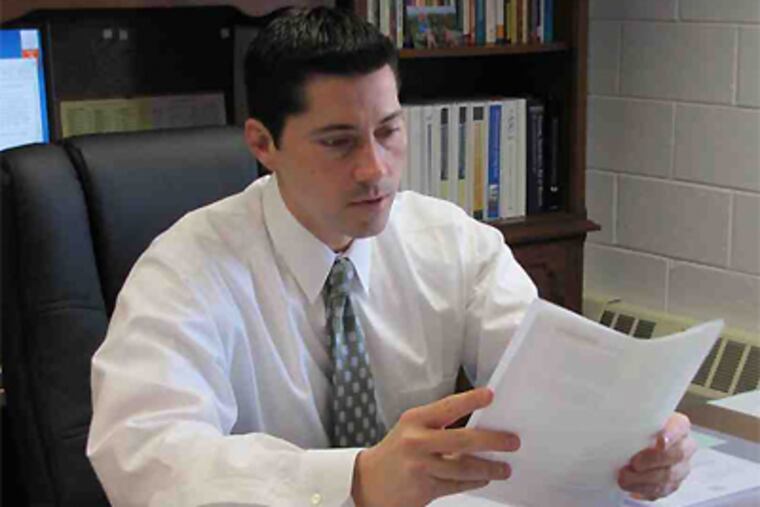Voters concern over property taxes affect Kingsway schools
When money gets tight, it is easier to rent a movie than to go out to the theater, or to make coffee at home than to spend $3 at Starbucks. It's also easier to refuse to increase property taxes to fund education. At least that's how it seems to residents in Kingsway Regional School District in Woolwich Township, Gloucester County.

When money gets tight, it is easier to rent a movie than to go out to the theater, or to make coffee at home than to spend $3 at Starbucks. It's also easier to refuse to increase property taxes to fund education. At least that's how it seems to residents in Kingsway Regional School District in Woolwich Township, Gloucester County.
The district has over 2,200 students in grades 7 through 12, from East Greenwich, South Harrison, Swedesboro-Woolwich Township, and Logan Township. Residents in these areas have to approve the district's budget each year. Students in grades K-6 are on their own separate budgets.
Under the district arrangement, Logan Township pays tuition to Kingsway for each student it sends to attend school there. Logan residents do not get a vote regarding the budget, as it does not affect their taxes.
In Woolwich, education has consistently been cut as property taxes have more than doubled since 2001. The last two years have hit the district hardest. It has had to shut down all after-school programs for the middle school, cut teachers - and once again, not purchase new textbooks.
Kingsway voters have not approved four of the last five budgets, but at the same time, Woolwich has seen dramatic changes in the last ten years. Once all farmland, it is now the fastest growing town in the state with a 15 percent population increase, according to the 2010 Census.
Superintendent James J. Lavender believes that part of this growth is because "quality schools are our community's most important asset."
A major concern of Lavender's is the increased number of students enrolled in the district. In the next five years, the district will exceed 3,000 students for grades 7 through 12. Students currently are packed 30 to a classroom. Some high school students find themselves in a study hall more than once a day due to lack of space in actual classes.
Senior Cassidy Moellers said she has seen the impact.
"Underclassmen were particularly affected by this because they lost the options of classes to take that I had when I was their age," she said. "To achieve educating well-rounded students, options have to be available for [them] to explore new and varying subjects."
When each April rolls around, voters are given a choice to pass Kingsway District's budget, which would result in another tax increase. Residents in Woolwich, such as Debbie Calabree, said the tax increases hurt, but are necessary.
"Financial circumstances play a role in everyone's decision on the budget," she said. "The increase in taxes already hurts us - however, not passing the budget impacts students substantially."
From 2005 to 2010, the district's budget failed to pass four times with an average of "less than 20 percent voter turnout," according to Lavender.
In December, Kingsway's voters overwhelmingly defeated a bond referendum for a $30 million expansion project.
Looking ahead, the district has few options. There will be another vote for the $30 million construction plan in the near future. If that does not pass, trailers could be purchased, or split sessions may take affect. To help raise private donations, the district is reviving a dormant educational foundation - Kingsway Education Foundation - to help reduce costs.
A visible problem is the "significant disconnect between the school and our community," Lavender said.
A majority of new families entering the district have young children. Lavender feels that these children are so young that their "[families] have not had an opportunity to get to know Kingsway."
Lisa Camp, a foreign language teacher at Kingsway for nine years, also feels that residents are too uninformed. "People don't realize how the lack of funding directly affects education," she said.
Developments have been springing up all over Woolwich within the last decade, which has caused a steady wave of new residents. Two brand-new elementary schools and a new middle school have been built to accommodate the influx of new students, along with additions on the high school and two already existing elementary schools. All of this construction occurred only in a few years.
With the increase in residents, there has not been a great increase in commercial properties. Currently, only 12 percent of the total population is commercial. The municipal council believes this number needs to be between 30 and 40 percent for an effective tax balance between residents and businesses. As a result of this percentage being so low, residents have had to fork over their own money to pay for the increase in various municipal services.
"Nobody wants to pay more taxes, but this is the way our state's school funding is set up," Camp said.
Despite the outcome of the upcoming April 27 budget election, Lavender said, "the bottom line is that we have to expand and we will have to build."